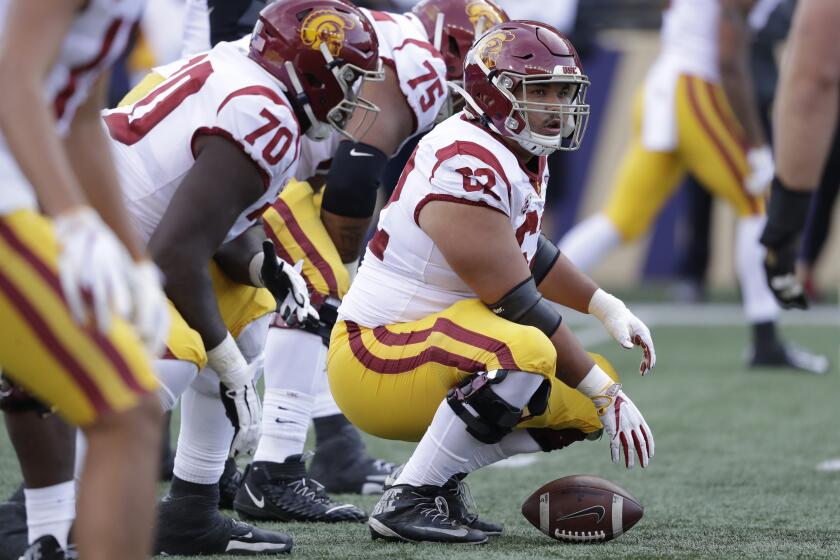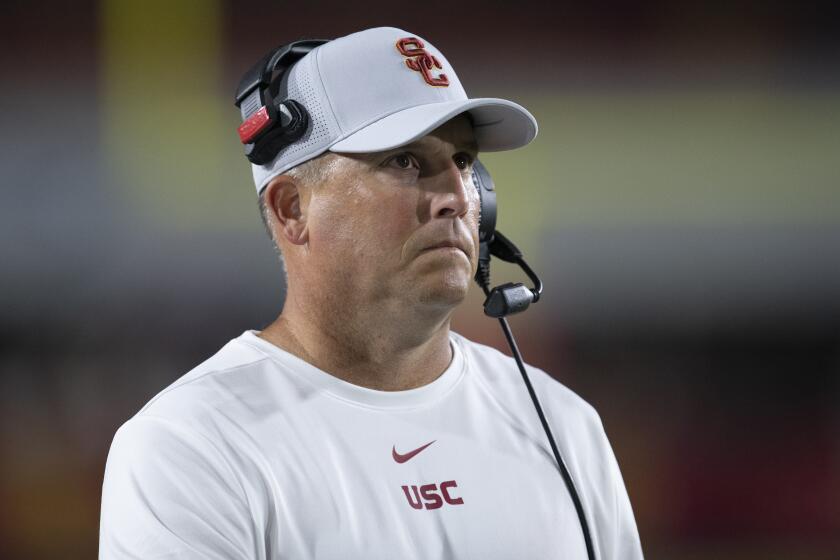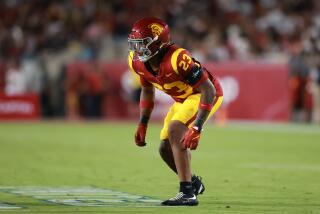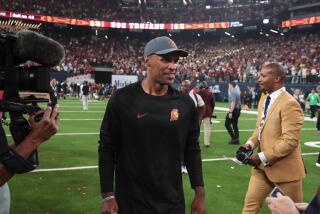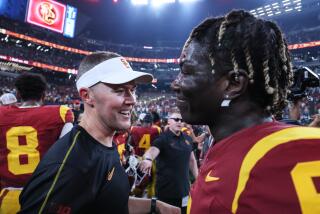USC’s new defensive coordinator didn’t waste time schooling Trojans on new scheme
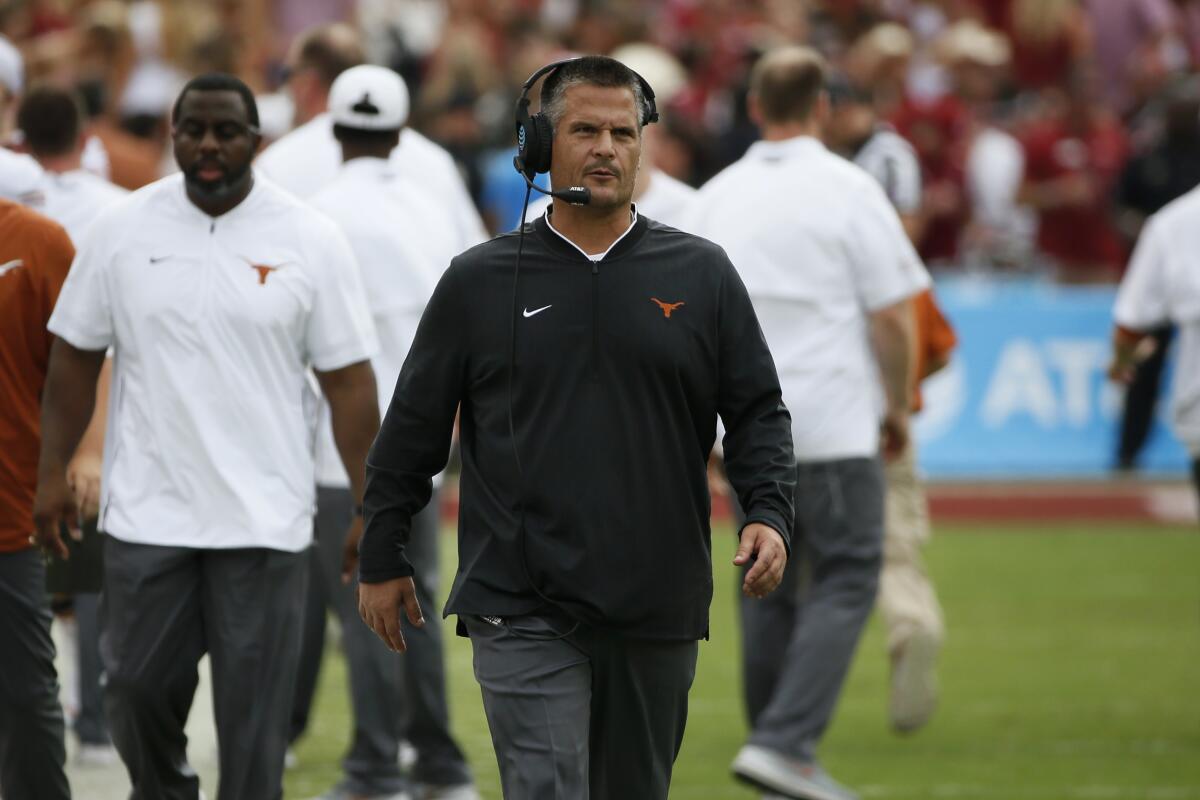
Through spring and summer, the physical, hard-nosed brand of defense Todd Orlando promised to bring to USC remained strictly theoretical. Aside from one spring practice, the intricacies of his scheme were installed only over Zoom. Hands-on coaching was limited to distanced learning. Contact drills were reduced to virtual cues.
The arrangement wasn’t ideal for anyone involved, least of all the new defensive coordinator tasked with toughening up a unit that, for seven months, was barred from standing next to each other, let alone colliding.
But that moratorium on full-contact practice was lifted Wednesday, finally offering Orlando a long-awaited glimpse of what his USC defense is made of.
“Today will be the day,” Orlando said Wednesday morning. “This is where the separation begins.”
That’s not to say those seven months were for naught. While some players struggled to learn virtually, he said the extra time spent installing and discussing the defense led to an especially sharp first week. Players retained more than he expected, and coaches got to know players better than they would have otherwise.
There are a lot of questions about how the Trojans’ offensive line will perform, but having Brett Neilon at center and Alijah Vera-Tucker at left tackle should help.
Orlando, who last coached defense at Texas, called the virtual install time “a blessing in disguise.” Even if it might only take his new defense so far.
“Until you go against live, at the end of the day you’re not going to trick everybody in terms of your scheme,” Orlando said. “You’re going to be based on how hard you run to the football, how you get off blocks and how you tackle.”
But those aren’t the only areas that were to be evaluated starting Wednesday. Considering how long players have had to learn the scheme, Orlando made clear he won’t be as forgiving when it comes to forgetting assignments.
“If you go out there and you don’t know what you’re doing after meeting with someone for seven months, that pretty much explains how much you care,” Orlando said. “That’s important to me. The more you put in, the more you get out.”
A clearer picture of USC’s new defense should crystallize in the coming days, with contact no longer limited. Orlando said he’s already adjusted his scheme, which relies on mixed fronts and aggressive blitzing, to fit USC’s personnel.
Drake Jackson, who spent last season as more of a strict defensive end, shed 25 pounds and shifted into a hybrid linebacker role. Safeties Talanoa Hufanga and Isaiah Pola-Mao are expected to take on more active roles in directing the defense. And with depth limited at linebacker, Ralen Goforth and Kana’i Mauga have emerged as top candidates to start alongside Palaie Gaoteote in roles they’ve had to learn on the fly.
USC coach Clay Helton says he’s noticed benefits from the Trojans’ unprecedented start to an unusual, pandemic-shortened season.
But full contact could always force further change.
The loss of Jay Tufele, who opted out to focus on the NFL draft, has already thrust senior defensive tackle Brandon Pili into the starting lineup.
“It left a big void in our defensive line, experiencewise,” Pili said. I just feel like now that burden is on me, being the veteran.”
Orlando has proven in previous stops that he’s capable of a quick reboot; though, never quite under the current circumstances he now faces. At Texas, Orlando oversaw a defense that improved from 80th to 24th in points allowed. Before that, his inaugural Utah State defense ranked seventh in points allowed.
In both cases, Orlando said, those defenses simply needed “a kickstart.”
“I think that’s what [I’ve done], the places I’ve been coming into, is just to try to free these guys up,” Orlando said. “It’s OKto fail, man. That’s what practice is about. Fail big.”
More to Read
Go beyond the scoreboard
Get the latest on L.A.'s teams in the daily Sports Report newsletter.
You may occasionally receive promotional content from the Los Angeles Times.

